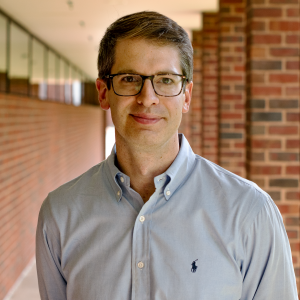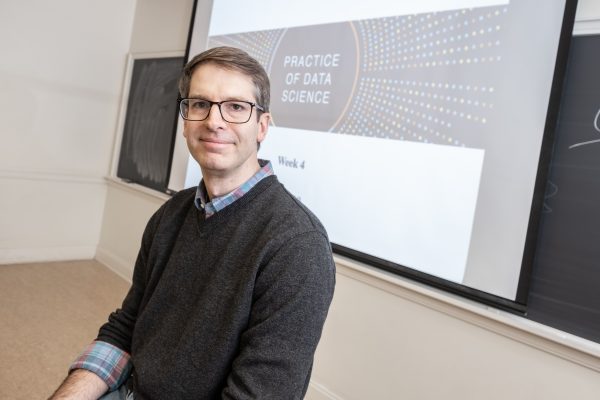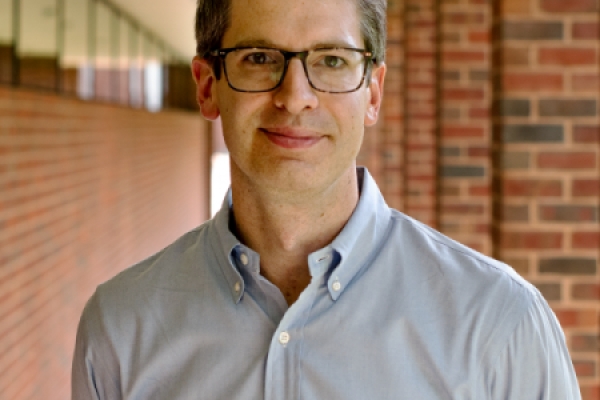Brian Wright Discusses Data Science Education on “Once Upon a Tech” Podcast
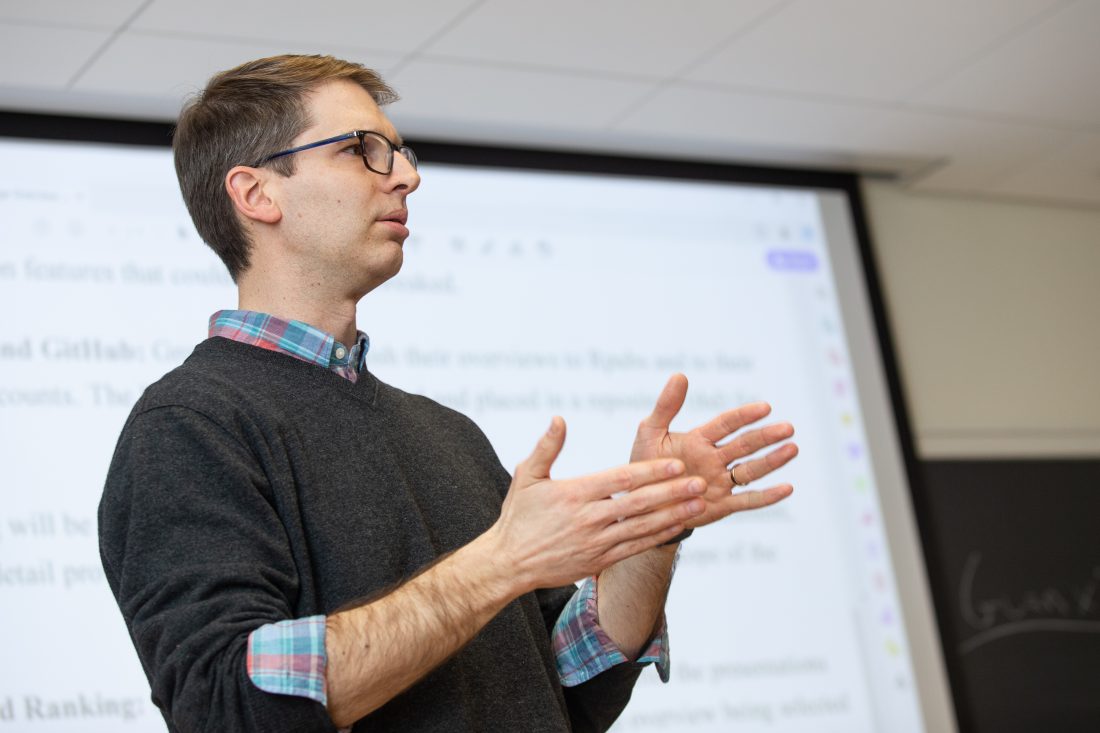
Faculty and leaders at the University of Virginia School of Data Science are in the relatively unique position of building a new undergraduate degree from the ground up and, as director of undergraduate programs, Associate Professor Brian Wright is leading that charge.
Wright was recently a guest on the “Once Upon a Tech” podcast, hosted by Sarah FitzHenry and Kim Wilkens to discuss intersections of literacy, technology and education. On the episode, Wright outlined his vision for UVA’s proposed undergraduate data science program.
In particular, Wright focused on combining the hard skills of data science – such as statistics, computer programming, analytics and mathematics – with core concepts of design, philosophy and ethics. Both, he said, are critical for a well-rounded education and present in plans for UVA’s program.
“It’s not very often that you get to create a new school and a new field at one of the best universities in the world. We are lucky to be able to do that here,” he said. “I think the foundations we are laying in the classes and the coursework, and the way that we define data science, we are hoping will echo out into the rest of the field. Because, we really do need to start differentiation from what it means to be in computer science or statistics … we had a really unique opportunity to do that here.”
UVA has built its data science curriculum around four core curricular components: value, analytics, systems and design. Value encompasses the human value and ethics of data science, design includes data visualization and user experiences, analytics focuses on AI and machine learning, and systems includes the technical infrastructure needed to create and support data science projects.
“If you take a step back, any data science product or project, in its lifecycle, has all four components,” Wright said. “I think that you can make an argument that, if it doesn’t, you are not doing something quite right.”
Wright, FitzHenry and Wilkens also discussed the preeminent importance of ethics in data science education. Tools such as artificial intelligence and machine learning are very powerful, Wright pointed out, and how those tools are used can make a huge impact – for good or for ill. He cited the concept of algorithmic bias, when computer algorithms reflect human biases because, for example, they were built around data from one racial or ethnic group to the exclusion of another. Or, Wright, said, practitioners might need to account for when an algorithm does not perform as expected or when it does more harm than good.
“We really have to help students understand their responsibility,” he said. “There is a philosophical component, and a policy component to all of this, and an equity and justice component.”
The proposed undergraduate degree, Wright noted, has been designed to incorporate ethics at every step, weaving lessons in ethical decision-making throughout the curriculum.
“It is not just one ethics course or a box to check,” he said. “To us, it is really organic to the program.”
Wright believes the thorough focus on ethics, leadership and policy, combined with an equally robust focus on technical skills and mastery will lead to well-rounded scholars and professionals who can be leaders in the field.
“We emphasize to students that you have to be not just an advocate, but an expert, in order to move the field forward,” he said.
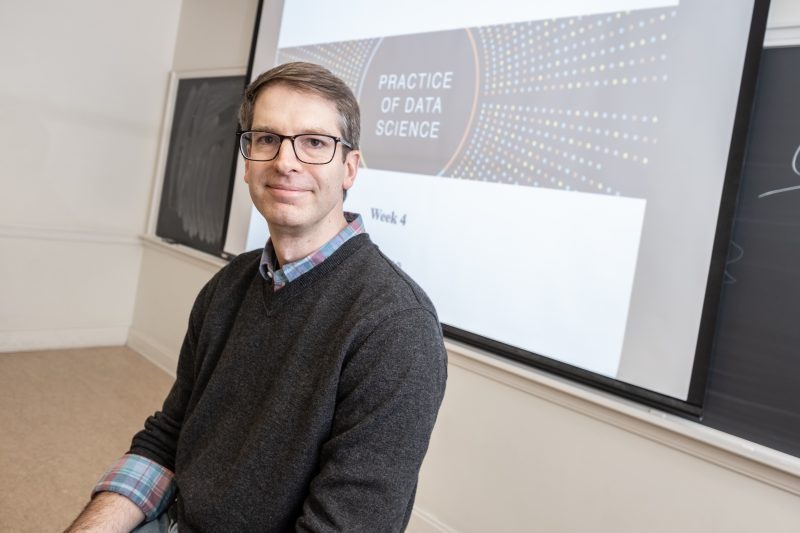
Even as Wright is working on building those skills into UVA’s proposed undergraduate data science program, he is also focused on K-12 education. Students can be introduced to key concepts in data science very early on, and Wright believes that doing so will lead more students, and students from more diverse backgrounds, to pursue careers in the field.
“We have been talking about what we have been doing at the collegiate level, but we really need to bring this to the K-12 level, and I think especially to K-8 spaces, because that is where we really have the opportunity to excite more students and get more diversity in these fields.”
At Buford Middle School in Charlottesville, for example, a UVA partnership supports the Buford Lab, which brings computer science and data science to middle school students. Students complete a Foundations of Data Science course, teaching students what it means to work in data science and helping them see real-world examples. In one lesson, students play the classic board game Guess Who, eliminating various cards to discover the character their opponent is playing.
At the end, program instructors point out, students have essentially mimicked what an algorithm does – building classifiers to sort through and make meaning out of data, in order to arrive at a correct conclusion. Wright also uses the lesson to point out risk of bias, because like in Guess Who, algorithms can only operate on the information that they have. If that information is solely focused on skin color or gender, for example, it could lead to bias.
“There is lots of really good content that speaks to what the field is going through,” Wright said.
Looking ahead, Wright sees “a lot to be excited about.”
“We are putting this program in place and, in a way, it is a great experiment to see how we can attract a wide variety of people to data science,” he said. “We launched a minor in data science a few years ago and it is wildly popular. There are more than 600 students in it and 54 different degrees represented.”
Ultimately, Wright said, he wants to build a program that brings together the best of STEM education while remaining inclusive and open to students with many different backgrounds and interests. The opportunity is enormous and he admitted to a few nerves, or at least nervous excitement.
“We have this unique opportunity in STEM education, to create a STEM field, so let’s create it in a way where it is inclusive, and people can envision themselves in it,” he said near the end of the podcast. “You don’t just get these opportunities… and it does make me nervous because it feels like we might only get one shot at it.
We have to be really purposeful in how we do it, and that is why I am really excited to get our version up and have it out there.”
